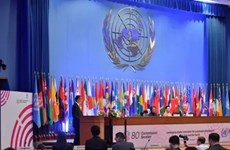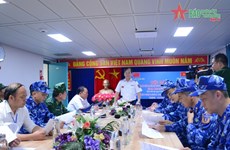Vietnam, Norway beef up cooperation in foreign policy studies
The Institute for Foreign Policy and Strategic Studies (IFPSS) under the
Diplomatic Academy of Vietnam and the Norwegian Institute of
International Affairs (NUPI) have signed a memorandum of understanding
encouraging experience sharing in foreign policy studies.
The Institute for Foreign Policy and Strategic Studies (IFPSS) under the
Diplomatic Academy of Vietnam and the Norwegian Institute of
International Affairs (NUPI) have signed a memorandum of understanding
encouraging experience sharing in foreign policy studies.
Under the agreement, IFPSS and NUPI will increase delegation exchanges and share experience in conducting research on foreign policies of each country, the Vietnam-Norway relations as well as regional and international matters.
The signing of the MOU between two key foreign policy research institutes of Vietnam and Norway will pave the way for researchers of both sides to increase their engagement in designing policies and measures to fully tap the potential and advantages of each country in the framework of bilateral ties, said IFPSS Director Hoang Anh Tuan.
Ulf Sverdrup, NUPI Director said developments in Southeast Asia and East Asia are becoming more relevant to the security and prosperity of Norway .
The MOU will help Norwegian researchers and policy-makers access more information of Vietnam and the region, thus boosting the country’s partnership with Vietnam and the Southeast Asia as a whole, he said.
Earlier on June 24, the Vietnamese Embassy in Norway and NUPI jointly organised a seminar on East Sea situation and its impacts on regional security.
In his key note speech, IFPSS Director Hoang Anh Tuan made clear that Vietnam has full historical and legal evidence to prove that the Vietnamese State of all times have claimed sovereignty over Hoang Sa (Paracel) and Truong Sa (Spratly) archipelagoes.
Particularly, Vietnam has exercised administrative management over Hoang Sa archipelago in a continuous manner without any disputes until China used forces to occupy the archipelago in 1974, he noted.
China’s placement of its oil rig Haiyang Shiyou-981 in Vietnam’s exclusive economic zone and continental shelf is totally illegal, while its “nine-dash line” claim is groundless without any historical and legal basis, infringing the 1982 United Nations Convention on the Law of the Sea (1982 UNCLOS), he said.
China’s aggressive actions and threat to use force as part of its attempt to arrogate the entire area within the “nine-dash line” is the major cause of the tension on the East Sea , Tuan stated.
He called on Norwegian researchers and the international community to raise their voice to demand China to obey international law and stop all unilateral actions that harm peace, stability and security in the region.
Participants at the event expressed concern about China’s actions in the East Sea, underscoring that only solutions reached by peaceful talks on the basis of equality and mutual respect in accordance with international law and the 1982 UNCLOS can bring long-term peace and stability for East Asia.
At the beginning of May 2014, China illegally dispatched the rig as well as a large fleet of armed vessels, military ships and aircraft to Vietnam’s waters and positioned the rig at 15 degrees 29 minutes 58 seconds north latitude and 111 degrees 12 minutes 06 seconds east longitude, 80 miles deep into Vietnam’s continental shelf and exclusive economic zone.
Despite Vietnam’s protest, China expanded its scale of operation and moved the rig to 15 degrees 33 minutes 36 seconds north latitude and 111 degrees 34 minutes 11 seconds east longitude, 60 nautical miles deep inside Vietnam’s continental shelf and exclusive economic zone.-VNA
Under the agreement, IFPSS and NUPI will increase delegation exchanges and share experience in conducting research on foreign policies of each country, the Vietnam-Norway relations as well as regional and international matters.
The signing of the MOU between two key foreign policy research institutes of Vietnam and Norway will pave the way for researchers of both sides to increase their engagement in designing policies and measures to fully tap the potential and advantages of each country in the framework of bilateral ties, said IFPSS Director Hoang Anh Tuan.
Ulf Sverdrup, NUPI Director said developments in Southeast Asia and East Asia are becoming more relevant to the security and prosperity of Norway .
The MOU will help Norwegian researchers and policy-makers access more information of Vietnam and the region, thus boosting the country’s partnership with Vietnam and the Southeast Asia as a whole, he said.
Earlier on June 24, the Vietnamese Embassy in Norway and NUPI jointly organised a seminar on East Sea situation and its impacts on regional security.
In his key note speech, IFPSS Director Hoang Anh Tuan made clear that Vietnam has full historical and legal evidence to prove that the Vietnamese State of all times have claimed sovereignty over Hoang Sa (Paracel) and Truong Sa (Spratly) archipelagoes.
Particularly, Vietnam has exercised administrative management over Hoang Sa archipelago in a continuous manner without any disputes until China used forces to occupy the archipelago in 1974, he noted.
China’s placement of its oil rig Haiyang Shiyou-981 in Vietnam’s exclusive economic zone and continental shelf is totally illegal, while its “nine-dash line” claim is groundless without any historical and legal basis, infringing the 1982 United Nations Convention on the Law of the Sea (1982 UNCLOS), he said.
China’s aggressive actions and threat to use force as part of its attempt to arrogate the entire area within the “nine-dash line” is the major cause of the tension on the East Sea , Tuan stated.
He called on Norwegian researchers and the international community to raise their voice to demand China to obey international law and stop all unilateral actions that harm peace, stability and security in the region.
Participants at the event expressed concern about China’s actions in the East Sea, underscoring that only solutions reached by peaceful talks on the basis of equality and mutual respect in accordance with international law and the 1982 UNCLOS can bring long-term peace and stability for East Asia.
At the beginning of May 2014, China illegally dispatched the rig as well as a large fleet of armed vessels, military ships and aircraft to Vietnam’s waters and positioned the rig at 15 degrees 29 minutes 58 seconds north latitude and 111 degrees 12 minutes 06 seconds east longitude, 80 miles deep into Vietnam’s continental shelf and exclusive economic zone.
Despite Vietnam’s protest, China expanded its scale of operation and moved the rig to 15 degrees 33 minutes 36 seconds north latitude and 111 degrees 34 minutes 11 seconds east longitude, 60 nautical miles deep inside Vietnam’s continental shelf and exclusive economic zone.-VNA












